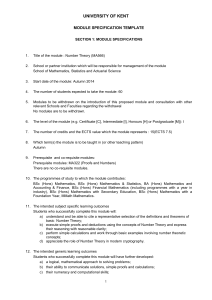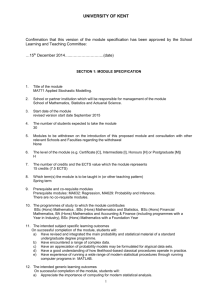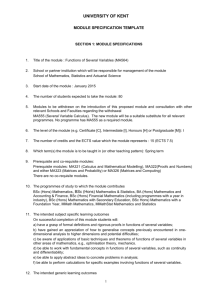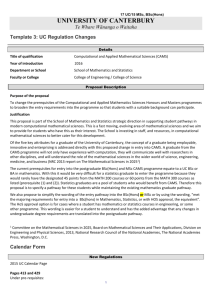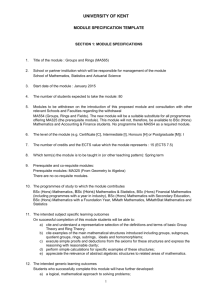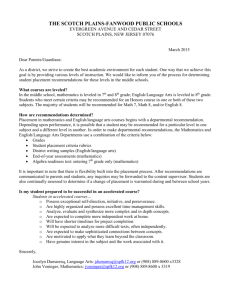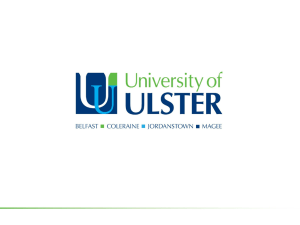Undergraduate Initial Teacher Education Scheme
advertisement
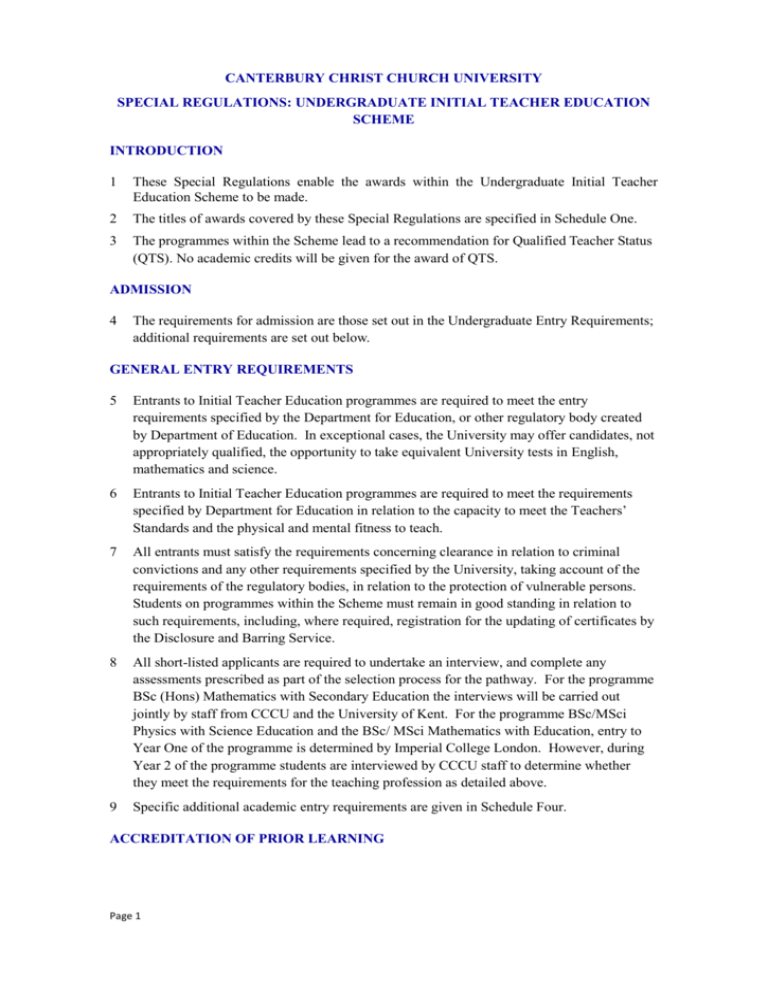
CANTERBURY CHRIST CHURCH UNIVERSITY SPECIAL REGULATIONS: UNDERGRADUATE INITIAL TEACHER EDUCATION SCHEME INTRODUCTION 1 These Special Regulations enable the awards within the Undergraduate Initial Teacher Education Scheme to be made. 2 The titles of awards covered by these Special Regulations are specified in Schedule One. 3 The programmes within the Scheme lead to a recommendation for Qualified Teacher Status (QTS). No academic credits will be given for the award of QTS. ADMISSION 4 The requirements for admission are those set out in the Undergraduate Entry Requirements; additional requirements are set out below. GENERAL ENTRY REQUIREMENTS 5 Entrants to Initial Teacher Education programmes are required to meet the entry requirements specified by the Department for Education, or other regulatory body created by Department of Education. In exceptional cases, the University may offer candidates, not appropriately qualified, the opportunity to take equivalent University tests in English, mathematics and science. 6 Entrants to Initial Teacher Education programmes are required to meet the requirements specified by Department for Education in relation to the capacity to meet the Teachers’ Standards and the physical and mental fitness to teach. 7 All entrants must satisfy the requirements concerning clearance in relation to criminal convictions and any other requirements specified by the University, taking account of the requirements of the regulatory bodies, in relation to the protection of vulnerable persons. Students on programmes within the Scheme must remain in good standing in relation to such requirements, including, where required, registration for the updating of certificates by the Disclosure and Barring Service. 8 All short-listed applicants are required to undertake an interview, and complete any assessments prescribed as part of the selection process for the pathway. For the programme BSc (Hons) Mathematics with Secondary Education the interviews will be carried out jointly by staff from CCCU and the University of Kent. For the programme BSc/MSci Physics with Science Education and the BSc/ MSci Mathematics with Education, entry to Year One of the programme is determined by Imperial College London. However, during Year 2 of the programme students are interviewed by CCCU staff to determine whether they meet the requirements for the teaching profession as detailed above. 9 Specific additional academic entry requirements are given in Schedule Four. ACCREDITATION OF PRIOR LEARNING Page 1 10 There are restrictions on the use of Accreditation of Prior Certificated Learning and the Accreditation of Prior Experiential Learning for entry to programmes within the Scheme, which are specified in Schedule Two. a. Applicants holding a Certificate of Education who can demonstrate that they have suitable experience equivalent to the first year of the BA (Hons) in Primary Education will be considered for direct entry to Level 5 of this pathway. b. Applicants holding a Diploma in Higher Education or Foundation Degree, who can demonstrate that they have had suitable experience equivalent to Level 4 and Level 5 of the BA (Hons) in Primary Education, and who satisfy the requirements relation to admission set out above, will be considered for direct entry to Level 6 of the BA (Hons) in Primary Education – Progression Route. c. No direct entry can be considered in respect of the BSc (Hons) Mathematics with Secondary Education, the BSc / MSci Physics with Science Education or the BSc /MSci Mathematics with Education. d. Applicants seeking direct entry cannot claim exemption from specific Professional Standards for QTS. MODULES 11 Students on programmes within this Scheme will not be able to choose starred modules. 12 The BSc (Hons) Mathematics with Secondary Education validated in collaboration with the University of Kent, and the BSc/MSci Physics with Science Education and BSc/MSci Mathematics with Education, validated in collaboration with Imperial College, may vary the module credit size from those specified in the Regulation and Credit Framework for the Conferment of Awards. ASSESSMENT 13 For specified programmes within the Scheme, students must pass all modules to receive an award. The specified programmes are set out in Schedule Three. 14 To be recommended for Qualified Teacher Status (QTS), students must be awarded a degree and meet the professional standards and requirements as laid down by the Department for Education from time to time. 15 Where required as part of the programme, students are to complete successfully all professional placements, including the submission of the requisite evidence, whether such evidence is required before, during or after the completion of the placements. 16 Students who fail a professional placement, after exhausting the resit opportunities, but who meet all other requirements for progression, shall be required to transfer to a non-QTS route. Such students will be required to complete a period of experience in another appropriate work setting in place of any remaining professional placements. Such students will not be recommended for QTS, but may be eligible for the award of a degree. Students may also be allowed to transfer to a degree in another Scheme if they meet the appropriate requirements. Page 2 17 A student who fails a professional placement after the re-sit opportunities have been exhausted will not be allowed to repeat the module and will be required to withdraw from the programme leading to QTS. RE-SIT ARRANGEMENTS FOR PROFESSIONAL PLACEMENTS 18 During a professional placement, mentors are required to report on each student’s progress. These ‘grading points’ could occur both during a placement and at the end of a placement. After each grading point, a Professional Placement Examination Board1 is convened and the performance of each student is recorded as either being Satisfactory or Unsatisfactory. 19 Provided that no professional suitability concerns have been identified a student graded as Unsatisfactory on Professional Placement will be: a. counselled as to their suitability for the remainder of the programme. If, after such counselling, the student decides to continue, s/he will be required to complete a re-sit of the professional placement, but in a different setting. b. required to attend a meeting with the Pathway Director and/or a relevant Curriculum/Professional Tutor to discuss their action plan and confirm targets for the re-sit professional placement. Any additional strategies discussed will be recorded and circulated to relevant mentors and tutors in order they can direct their support to the specific needs of the individual student. 20 A student will only be given an opportunity to re-sit a professional placement if all the following criteria have been met: (i) The student has created an action plan, approved by the Pathway Director, to address the issues raised on his/her unsatisfactory placement, which gives a clear outline of the actions the student will take to improve their practice in these areas; (ii) There is no evidence that the student has not demonstrated a willingness to adopt a constructive approach to the advice received from either the mentor, University tutor(s), and any other advisors in relation to their targets and progress towards the Standards for QTS; (iii) There is no evidence that the student has deviated significantly from the behaviour which is commensurate with a professional code of conduct. If a re-sit placement is offered, the timing of that resit placement is decided by the Professional Placement Examination Board. A student does not have the right to decide when or where a placement is repeated. 21 The re-sit professional placement must be completed successfully before proceeding to the next scheduled professional placement. 22 In exceptional circumstances, where the Professional Placement Examination Board have evidence that the practice of the student has been of such significant concern that the learning and/or welfare of pupils and schools is jeopardised by the continued presence of that student on placement, the student will be referred to the Professional Suitability Panel [http://www.canterbury.ac.uk/quality-and-standards-office/regulation-and-policy-zone/regulationand-policy-zone.aspx#P]. 1 http://www.canterbury.ac.uk/support/quality-and-standards-office/policies/index.asp Page 3 23 In the case of a student on a final placement failing to reach the required standard in a small number of areas, the Professional Placement Examination Board has the discretion to recommend an extended period of placement (but less than the full period) in order for the student to meet the full standards. COMPENSATION 24 The programmes are excluded from compensation. ATTENDANCE REQUIREMENTS 25 Students are required to attend all university sessions as determined by the programme handbook. Registers will be kept. 26 The penalties for authorised absence or for absence for modules taught by CCCU due to certificated illness are as follows: Absence from Professional Placement and/or University sessions 1-5 days 6-10 days 11-30 days Over 30 days Penalty Nil At the Pathway Director’s discretion, depending on the student teacher’s ability to demonstrate that pathway requirements can be or have been met in remaining normal pathway time Required additional time, as specified by the particular pathway director Student must re-take the whole pathway / whole year or level. 27 Students will be required to keep their own register of attendance during a professional placement, which will be signed by their mentor and checked by tutors at regular intervals. 28 In the case of students who are unavoidably absent during a professional placement through illness or other good cause, which is indicated via concessions evidence received from the student, the Professional Placement Examination Board may recommend a deferred assessment and require the time missed to be made up on professional placement at a later date, usually at the end of the stage/ year. 29 Absences to attend job interviews or graduations are exempt from these considerations but students must make all possible efforts to minimise absence. 30 The penalties for unauthorised absence are as above, except that, in addition, the work of any student teacher who takes one or more days of unauthorised absence will be designated as giving Cause for Concern for Professional Values and Practice. Tutors and Mentors will draw unauthorised absences to the attention of the Pathway Director so that the designation of Cause for Concern can be made. APPROVAL 31 The Academic Board approved the Protocols on 24 August 2012. The document was revised in June 2015 (see Schedule Five). COMMENCEMENT DATE 32 The Special Regulations are effective from 1st September 2012. Page 4 The Special Regulations for the BSc/MSci Physics with Science Education and BSc/MSi Mathematics with Education are effective from June 2015. The Special Regulations for the BA (Hons) in Primary Education with Mathematics Specialism are effective from September 2015. Page 5 CANTERBURY CHRIST CHURCH UNIVERSITY PROTOCOLS RELATING TO THE UNDERGRADUATE INITIAL TEACHER EDUCATION SCHEME SCHEDULE ONE PROGRAMMES 1 2 3 4 5 Programme Name BA (Hons) in Primary Education BSc (Hons) in Mathematics with Secondary Education BSc/MSci in Physics with Science Education BSc/MSci in Mathematics with Education BA (Hons) in Primary Education with Mathematics Specialism Programme Code Date Validated SCHEDULE TWO APL EXCEPTIONS 1 2 3 4 5 Programme Name BA (Hons) in Primary Education BA (Hons) in Primary Education – Progression Route BA (Hons) in Primary Education with Mathematics Specialism BSc (Hons) in Mathematics with Secondary Education BSc (Hons) in Physics with Science Education APL exceptions None None None No APL is permitted for modules conferring QTS. No APL is permitted for modules conferring QTS. SCHEDULE THREE ASSESSMENT VARIATIONS 1 2 3 4 5 Programme Name BA (Hons) in Primary Education BA (Hons) in Primary Education with Mathematics Specialism BSc (Hons) in Mathematics with Secondary Education BSc/MSci Physics with Science Education BSc/MSci Mathematics with Education Page 6 Assessment Variations Pass all modules Pass all modules Pass all modules for QTS Pass all CCCU modules for QTS SCHEDULE FOUR ADDITIONAL ACADEMIC ENTRY REQUIREMENTS 1 2 3 4 5 6 Programme Name BA (Hons) in Primary Education Additional Specific Entry Requirements BA (Hons) in Primary Education – Progression Route BA (Hons) in Primary Education with Mathematics Specialism BSc (Hons) in Mathematics with Secondary Education BSc/MSci in Physics with Science Education None BSc/MSci in Mathematics with Education Normally specific A Level grades and/or UCAS points, above the minimum level specified by the University, will be required. These requirements will be varied in negotiation with the Director of Admissions. Mathematics GCSE at Grade B or above, or equivalent A grade ‘A’ in A Level Mathematics (or its equivalent) A grade ‘A*’ in A Level Mathematics, grade ‘A’ in A Level Physics and at least one other grade ‘A’ at A Level. ‘A*’ grade in A Level Mathematics, ‘A*’ in A Level Further Mathematics and at least one other grade ‘A’ at A Level. The validity of equivalent qualifications is determined by the relevant Admissions agency in conjunction with the programme team. The decision made by the Admissions agency is final. SCHEDULE FIVE SUMMARY OF AMENDMENTS Reference 1 Date May 2015 Last Updated: 21st May 2015 Page 7 Change Addition of BA (Hons) in Primary Education with Mathematics Specialism.
